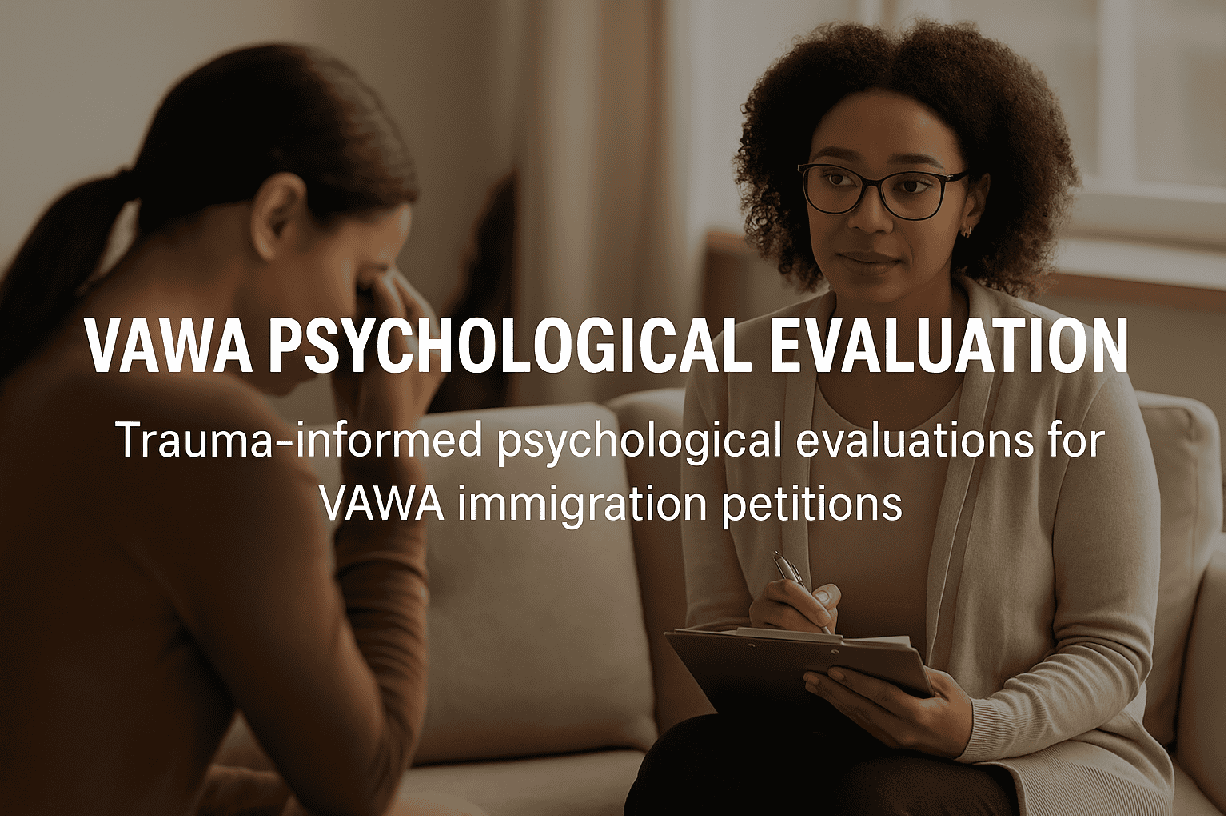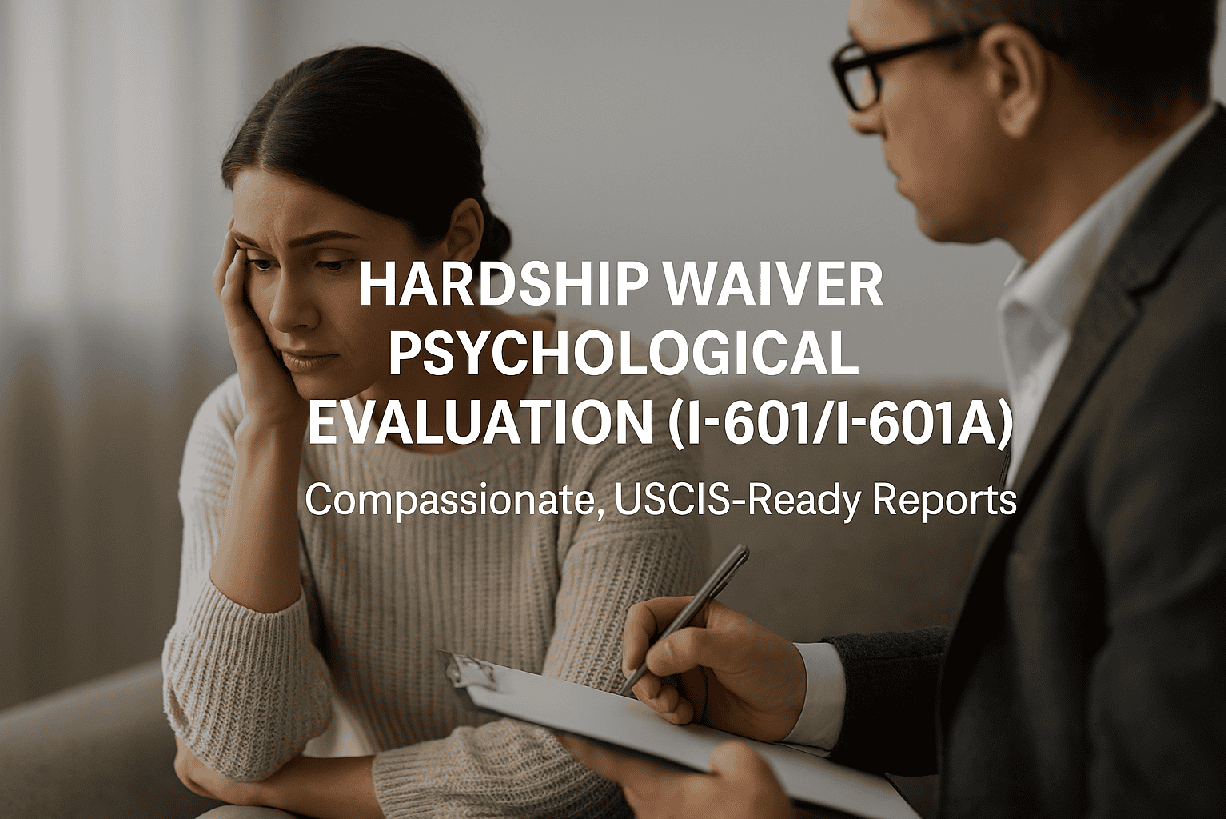
What Makes a Strong Immigration Psychological Evaluation? A Clinical Guide for Attorneys and Applicants
What Makes a Strong Immigration Psychological Evaluation? A Clinical Guide for Attorneys and Applicants
Immigration psychological evaluations can provide clinically grounded documentation of mental health symptoms, functional impairment, and the emotional impact of immigration-related stressors. A well-prepared evaluation is structured, evidence-based, and clearly written so that attorneys and adjudicators can understand the clinical findings without confusion or overstatement. Below is a practical, clinician-informed overview of what high-quality immigration psychological evaluations typically include, how they may vary by case type, and how to select a qualified provider in Texas.The Role of an Immigration Psychological Evaluation
An immigration psychological evaluation is a clinical assessment that documents psychological symptoms, diagnoses (when appropriate), and the ways those symptoms affect daily functioning. The evaluation may also describe the anticipated emotional and practical consequences of immigration outcomes such as family separation, relocation, or ongoing legal uncertainty. These evaluations are not “approval letters,” and they do not guarantee any legal outcome. Their purpose is to provide a clear clinical picture using professional standards and objective documentation.Who Conducts Immigration Psychological Evaluations?
Immigration psychological evaluations are typically conducted by licensed mental health professionals, such as psychologists or licensed professional counselors, who have experience assessing trauma, anxiety, depression, and related conditions. The strongest evaluations reflect:- Appropriate licensure in the state where services are provided
- Training in evidence-based assessment and trauma-informed care
- Experience with immigration-related clinical documentation and case-specific considerations
- Clear boundaries between clinical opinions and legal determinations
Core Components of a Strong Immigration Psychological Evaluation
1) A Thorough Clinical Interview
A strong evaluation begins with a detailed clinical interview. This typically includes presenting concerns, symptom history, prior mental health treatment, medical history as relevant, and current stressors. The goal is to understand what symptoms are present, how long they have been occurring, and how they affect functioning across key areas of life.2) Psychosocial and Family History
Immigration cases often involve complex family systems and long-standing stress. A well-prepared evaluation documents relevant background information (e.g., family relationships, caregiving responsibilities, major losses, trauma exposure, employment history, and community supports) without unnecessary detail or speculation.3) Standardized Screening Measures (When Clinically Appropriate)
Many strong evaluations incorporate validated screening tools to support clinical impressions. These measures do not replace clinical judgment, but they can provide an additional layer of documentation that increases clarity and reliability. Depending on the presenting concerns, a provider may use measures that screen for:- Depressive symptoms
- Anxiety symptoms
- Post-traumatic stress symptoms
- Functional impairment
- Sleep disturbance or somatic stress reactions
4) A Clear Mental Status Examination
The mental status examination (MSE) documents observable clinical findings during the interview—such as appearance, orientation, mood/affect, thought processes, cognition, and insight/judgment. A strong MSE is brief, factual, and consistent with the symptoms described.5) Diagnostic Impressions and Differential Considerations
When warranted, an evaluation may include diagnostic impressions (for example, depressive disorders, anxiety disorders, trauma- and stressor-related disorders). Strong evaluations avoid overreach: they connect diagnoses to documented symptoms and explain the clinical reasoning in understandable language.6) Functional Impact: What Symptoms Change in Daily Life
One of the most important components is a clear description of functional impact. This can include effects on:- Work performance and stability
- Parenting and caregiving responsibilities
- Sleep, appetite, energy, and concentration
- Relationships and communication
- Medical adherence and self-care
- Community involvement and support networks
7) A Focused, Objective Clinical Summary
A well-written evaluation summarizes key findings in a way that is easy to follow. It highlights major symptoms, clinical impressions, and functional consequences, using neutral language and avoiding legal conclusions.How Evaluations Differ by Immigration Case Type
While the clinical foundation remains consistent, the focus of the evaluation may differ depending on the type of immigration matter. Below are examples of common evaluation types and the clinical themes they often involve.I-601 / I-601A Hardship Waiver Psychological Evaluations
These evaluations often focus on the emotional and functional impact of potential separation or relocation, including how mental health symptoms affect a qualifying relative’s ability to work, parent, manage medical needs, or maintain stability. Clinically relevant supports and protective factors may also be documented.Cancellation of Removal (EOIR-42A / EOIR-42B) Psychological Evaluations
In these matters, evaluations commonly document the clinical impact of prolonged uncertainty, disruption of family stability, and emotional consequences tied to separation. When children or vulnerable family members are involved, the evaluation may include observations related to caregiving and emotional functioning in the home.I-246 Stay of Removal Psychological Evaluations
These evaluations often address acute stress, fear, and destabilization related to imminent removal, including symptom escalation, sleep disruption, panic symptoms, and functional impairment that may arise when removal is a current possibility.VAWA Immigration Psychological Evaluations
VAWA evaluations frequently include trauma-informed assessment, documentation of coercive control or abuse-related stress responses, and careful attention to safety, stabilization, and symptom patterns consistent with trauma exposure. Strong evaluations are sensitive, detailed, and clinically grounded.U-Visa Psychological Evaluations
U-Visa evaluations often document the psychological effects of victimization, such as hypervigilance, avoidance, intrusive memories, anxiety, depression, and changes in functioning at work or at home. They may also address barriers to disclosure and the impact of ongoing fear.T-Visa Psychological Evaluations
T-Visa evaluations commonly focus on complex trauma reactions, chronic stress, and functional impairment after exploitation. The assessment typically uses a trauma-informed approach and may document symptoms that affect safety, trust, sleep, and daily stability.I-130 (Petition for Alien Relative) Psychological Evaluations
These evaluations may focus on the emotional and functional impact of separation and uncertainty on the family unit, including stress-related symptom development and changes in daily functioning, relationship stability, and mental health.Common Misconceptions About Immigration Psychological Evaluations
“A psychological evaluation guarantees approval.”
No evaluation can guarantee a legal outcome. The role of the evaluation is clinical documentation—symptoms, functioning, and clinical impressions—presented clearly and ethically.“An immigration evaluation is the same as a therapy letter.”
Therapy and evaluation are different services. An evaluation is typically more structured, includes specific assessment components, and is written as an organized clinical document.“The evaluator should make legal conclusions.”
Strong evaluations avoid legal conclusions. Instead, they provide clinical findings that attorneys may integrate into the broader case strategy.Ethical and Professional Standards That Matter
High-quality immigration psychological evaluations reflect professional ethics and careful clinical boundaries. Strong providers typically emphasize:- Informed consent and clear explanation of the evaluation purpose
- Clinical independence (objective reporting without promises)
- Trauma-informed interviewing and sensitivity to distress
- Confidentiality practices consistent with professional standards
- Accurate documentation based on interview and assessment findings
How to Choose a Qualified Immigration Evaluation Provider in Texas
If you are selecting a provider, consider using this checklist:- Verify licensure and confirm the provider is authorized to practice in Texas
- Ask about experience with the specific case type (e.g., I-601/I-601A, VAWA, U-Visa)
- Request a clear process (intake, interview, measures, report delivery)
- Confirm communication expectations (timeline, revisions, and attorney coordination)
- Choose the right format: telehealth statewide or in-person in Sugar Land/Katy
Frequently Asked Questions
How long does an immigration psychological evaluation take?
The evaluation interview length varies based on the complexity of the history and symptoms. Many providers also require time for record review (if applicable), scoring of measures, and report drafting.Can immigration psychological evaluations be done by telehealth in Texas?
Many providers offer telehealth appointments across Texas when clinically appropriate and permitted under professional rules. In-person appointments may also be available depending on location.What if the person being evaluated becomes distressed during the interview?
A trauma-informed evaluator monitors distress, uses pacing strategies, and prioritizes safety. Breaks may be used as needed, and recommendations may include ongoing counseling or additional support.Does the evaluation include treatment or therapy?
An evaluation is an assessment service. Some clinics also offer therapy services, but the evaluation itself is typically a separate clinical process.Immigration Psychological Evaluations in Texas
Motivations Counseling provides immigration psychological evaluations for clients across Texas via telehealth, with in-person appointments in Sugar Land and Katy. If you are an attorney or applicant seeking a structured, evidence-based clinical evaluation, review our immigration evaluation services below. Learn more about Fast Immigration Psychological Evaluations (Texas)- I-601 / I-601A Hardship Waiver Psychological Evaluation
- I-246 Stay of Removal Psychological Evaluation
- Cancellation of Removal (EOIR-42A / EOIR-42B) Psychological Evaluation
- VAWA Immigration Psychological Evaluation
- U-Visa Psychological Evaluation
- T-Visa Psychological Evaluation
- I-130 (Petition for Alien Relative) Psychological Evaluation









